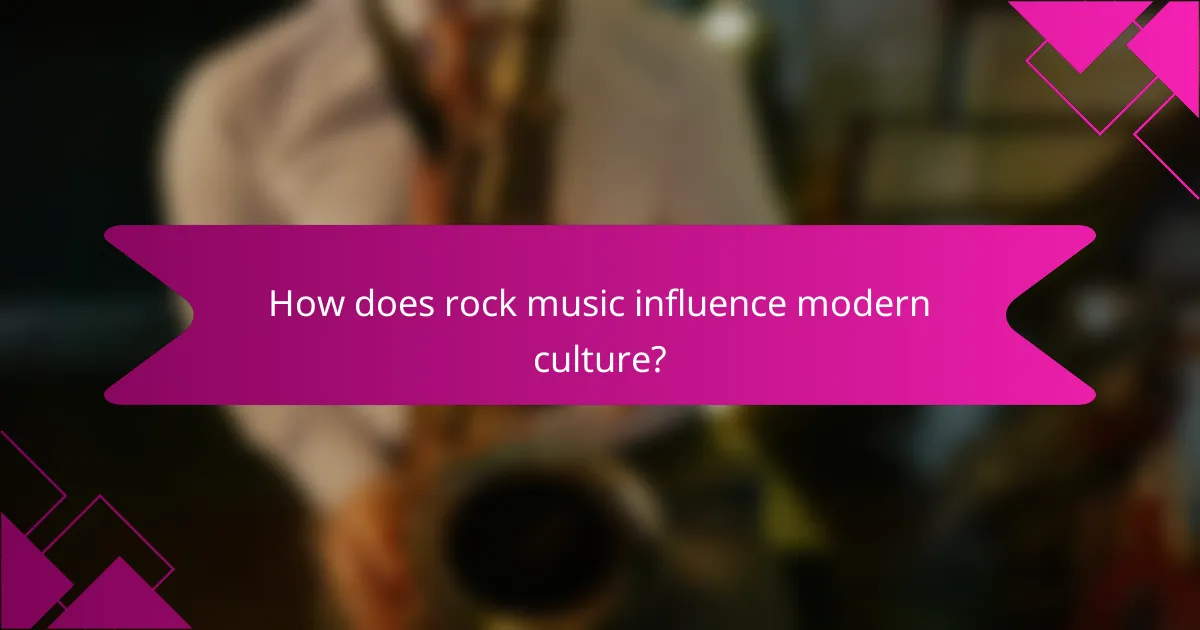Rock music is a dynamic genre characterized by powerful instrumentation and compelling lyrical storytelling that captures the essence of rebellion. With its electric guitars, bass, and drums, rock creates an unmistakable sound that resonates deeply with listeners. The genre’s narratives often explore personal experiences and social issues, forging a strong emotional connection that inspires and influences culture.

How does rock music influence modern culture?
Rock music significantly shapes modern culture by influencing youth identity, driving social movements, and integrating into digital media. Its powerful instrumentation and rebellious themes resonate with listeners, prompting cultural shifts and inspiring generations.
Impact on youth identity
Rock music plays a crucial role in shaping youth identity by providing a voice for self-expression and individuality. Many young people identify with the themes of rebellion and freedom found in rock lyrics, which often reflect their struggles and aspirations.
For instance, genres like punk rock and grunge have historically empowered youth to embrace non-conformity and challenge societal norms. This influence can be seen in fashion choices, lifestyle decisions, and even political views, as rock music encourages a sense of community among its listeners.
Role in social movements
Rock music has been a driving force in various social movements, often serving as an anthem for change. Artists have used their platforms to address issues such as civil rights, anti-war sentiments, and environmental concerns, galvanizing public support and awareness.
Iconic songs like “Imagine” by John Lennon and “Fight the Power” by Public Enemy exemplify how rock music can inspire activism and unite people around a common cause. These tracks not only reflect societal issues but also motivate listeners to take action.
Integration in digital media
The integration of rock music into digital media has transformed how it is consumed and shared. Streaming platforms, social media, and video-sharing sites allow fans to access a vast array of rock music and discover new artists easily.
Moreover, rock music often features prominently in films, commercials, and video games, enhancing storytelling and emotional impact. This cross-platform presence helps maintain its relevance in contemporary culture, attracting both new fans and retaining long-time listeners.

What are the key elements of rock music instrumentation?
Rock music instrumentation primarily revolves around electric guitars, bass guitars, and drums, each contributing to the genre’s distinctive sound. These elements work together to create powerful rhythms and melodies that often reflect rebellious themes and emotional storytelling.
Electric guitar techniques
Electric guitar techniques are central to rock music, featuring a variety of styles such as power chords, riffs, and solos. Techniques like bending, tapping, and using distortion effects can enhance the expressiveness of a performance. For instance, a simple power chord progression can form the backbone of many rock songs, creating a strong, driving sound.
Guitarists often experiment with different effects pedals to achieve unique tones. Common effects include overdrive, fuzz, and delay, which can add depth and texture to the music. Understanding how to combine these techniques effectively can elevate a guitarist’s performance and contribute to the overall impact of a rock song.
Drum patterns and rhythms
Drum patterns and rhythms in rock music are characterized by strong backbeats and varied tempos. The typical rock beat emphasizes the snare on the second and fourth beats, creating a driving pulse that supports the other instruments. Variations in tempo and rhythm can help convey different emotions, from high-energy anthems to slower ballads.
Drummers often incorporate fills and syncopation to add interest and complexity to a song. A well-placed drum fill can signal transitions between sections, enhancing the song’s dynamics. It’s essential for drummers to maintain a solid groove while being adaptable to the band’s overall sound and style.
Bass guitar’s role
The bass guitar plays a crucial role in rock music by providing the harmonic foundation and connecting the rhythm of the drums with the melody of the guitars. A strong bass line can enhance the overall groove and drive of a song, often working in tandem with the drums to create a cohesive sound. Bassists should focus on locking in with the drummer to establish a solid rhythmic backbone.
In many rock songs, the bass guitar also adds melodic elements, complementing the guitar riffs and enhancing the song’s emotional impact. Techniques like slides, harmonics, and syncopation can make the bass line more engaging. Understanding the interplay between bass and other instruments is key to crafting a powerful rock sound.

How do rock lyrics convey storytelling?
Rock lyrics convey storytelling through vivid narratives that often reflect personal experiences, social issues, and rich imagery. These elements combine to create a powerful emotional connection with listeners, making the stories relatable and impactful.
Personal narratives
Personal narratives in rock music often draw from the artist’s own life experiences, struggles, and triumphs. These stories can range from heartbreak and loss to celebration and resilience, allowing listeners to connect on a deeply emotional level. For example, songs like “Landslide” by Fleetwood Mac explore themes of growth and self-reflection, resonating with anyone who has faced significant life changes.
When crafting personal narratives, artists typically focus on authenticity and vulnerability. This approach not only engages the audience but also invites them to reflect on their own experiences, creating a shared sense of understanding.
Social commentary
Rock lyrics frequently serve as a platform for social commentary, addressing issues such as inequality, war, and political unrest. Artists like Bruce Springsteen and Rage Against the Machine use their music to challenge societal norms and provoke thought, often inspiring movements or change. Songs like “Fortunate Son” critique privilege and the impact of war on the less fortunate, making powerful statements that resonate with listeners.
Effective social commentary in rock music often combines storytelling with a call to action. This dual approach not only highlights the issues at hand but also encourages listeners to engage with the world around them, fostering a sense of community and activism.
Imagery and symbolism
Imagery and symbolism play a crucial role in rock lyrics, enhancing the storytelling by creating vivid mental pictures and deeper meanings. Artists often use metaphors and symbols to convey complex emotions and themes, allowing listeners to interpret the songs in personal ways. For instance, the use of “fire” in songs can symbolize passion, destruction, or transformation, depending on the context.
To effectively incorporate imagery and symbolism, songwriters should focus on relatable and evocative language. This technique not only enriches the narrative but also invites listeners to engage their imagination, making the music more memorable and impactful.

What are the rebellious themes in rock music?
Rebellious themes in rock music often challenge societal norms and express dissatisfaction with authority. These themes resonate through powerful instrumentation and compelling lyrics, reflecting a spirit of defiance and a quest for personal freedom.
Anti-establishment messages
Anti-establishment messages in rock music convey a strong opposition to political and social systems. Artists like The Clash and Rage Against the Machine use their music to critique government policies and corporate greed, encouraging listeners to question authority. This genre often serves as a voice for the marginalized, highlighting issues such as inequality and injustice.
Individualism and freedom
Individualism and freedom are central to rock music, celebrating personal expression and the rejection of conformity. Many rock songs emphasize the importance of being true to oneself, often portraying the struggle against societal pressures. This theme resonates with listeners who seek to assert their identity and pursue their passions without restrictions.
Counterculture movements
Counterculture movements have significantly influenced rock music, with genres emerging as responses to mainstream culture. The 1960s and 1970s saw rock music become synonymous with movements advocating for peace, civil rights, and sexual liberation. Bands like Jefferson Airplane and The Doors embodied the spirit of rebellion, inspiring generations to challenge the status quo and embrace alternative lifestyles.

Which rock bands exemplify powerful instrumentation?
Several rock bands are renowned for their powerful instrumentation, characterized by strong guitar riffs, dynamic drumming, and impactful bass lines. These elements create a rich sound that enhances the emotional depth of their music.
Led Zeppelin
Led Zeppelin is often celebrated for their groundbreaking approach to rock instrumentation. Their use of electric guitar, intricate drum patterns, and orchestral arrangements set a high standard for musical complexity. Songs like “Whole Lotta Love” showcase Jimmy Page’s iconic guitar riffs and John Bonham’s thunderous drumming, making their sound both powerful and memorable.
The band’s ability to blend various genres, including blues and folk, further exemplifies their innovative instrumentation. Tracks such as “Kashmir” highlight their use of layered sounds and unique time signatures, creating an epic listening experience.
Queen
Queen is known for their theatrical and diverse instrumentation, which combines rock with elements of opera and pop. Freddie Mercury’s powerful vocals are complemented by Brian May’s distinctive guitar work and Roger Taylor’s dynamic drumming. Songs like “Bohemian Rhapsody” feature complex arrangements that shift between soft ballads and hard rock, showcasing their versatility.
The band’s innovative use of harmonies and multi-tracked vocals adds depth to their sound. Queen’s ability to create anthemic choruses, as seen in “We Will Rock You,” demonstrates their knack for powerful instrumentation that resonates with audiences worldwide.
Foo Fighters
Foo Fighters exemplify powerful instrumentation in modern rock, combining heavy guitar riffs with melodic hooks. Founded by Dave Grohl, the band is known for its energetic performances and solid sound. Tracks like “Everlong” highlight their ability to balance intensity with emotional depth, featuring driving rhythms and catchy choruses.
Their instrumentation often includes layered guitars and dynamic drumming, creating a robust sound that appeals to a wide audience. The Foo Fighters’ commitment to high-energy rock is evident in songs like “The Pretender,” where powerful instrumentation drives the song’s momentum.
